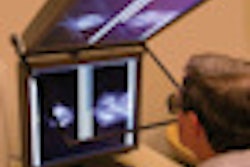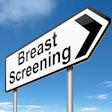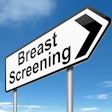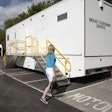Dear AuntMinnie Member,
You may have heard of most of the new mammography technologies -- digital breast tomosynthesis, spectral mammography, etc. -- but have you heard of stereo mammography?
If not, you'll want to read a new article in our Women's Imaging Digital Community about work being done at Emory University, where researchers have developed what they're calling stereoscopic digital mammography. The technology involves two mammography images of the same breast, presented on dual displays. A glass plate separates the images, and radiologists read the images with special polarized glasses.
The researchers believe that the technology duplicates how humans see the world, and it could help breast imagers visualize pathology located at different depths in the breast. Learn more about how well it worked in a patient population of nearly 800 women by clicking here.
A major step for ABUS
In other news, another new breast imaging technology, automated breast ultrasound (ABUS), got a big vote of confidence late last week when multimodality OEM GE Healthcare completed a deal to buy ABUS developer U-Systems.
ABUS systems leverage the proven ability of ultrasound to visualize pathology in women with certain conditions, such as dense breast tissue, that might confound conventional x-ray-based mammography. But it offers workflow improvements because it's performed in an automated fashion.
The GE deal means that U-Systems' somo.v scanner will reach a much wider audience far more quickly than if U-Systems tried to market the system on its own. And that could be a boon to the many women with dense breast tissue who are just now learning that mammography may not be the best technology for them.
Learn more by clicking here, or visit our Women's Imaging Digital Community at women.auntminnie.com.
Hope for VC?
Finally, proponents of virtual colonoscopy (also known as CT colonography or CTC) were devastated when their appeal to secure Medicare payment for colon cancer screening exams was rejected in 2009. But they've dusted themselves off and continue to push for federal support for the technology.
At the recent International Symposium on Virtual Colonoscopy, CTC proponents gathered to plan their strategy for taking another run at Medicare payments. They believe that 2013 will be a key year for the effort, given that the U.S. Preventive Services Task Force is set to conduct its five-year review of colon cancer screening guidelines in the fall.
The meeting was private, but international editor Eric Barnes got a briefing from participants that you can read by clicking here.



















